International Symposium on Zoonoses Research with a focus on "Neglected Tropical Diseases" (NTDs) brings together over 400 scientists from all over the world in Berlin
Neglected Tropical Diseases (NTDs) are infectious diseases that occur mainly in tropical and subtropical regions of the world. According to the WHO, population groups primarily affected include those living in poverty, lacking access to adequate sanitation or living in close contact with animals. Globalisation and climate change are dramatically changing the potential danger posed by these often zoonotic diseases. In this context, the risk of infection with new pathogens is also increasing for non-tropical countries such as Germany, as the recent first human case of West-Nile-Virus (WNV) infection in the country demonstrates. Therefore, this year's symposium of the German Research Platform for Zoonoses focused on NTDs.
Zoonoses research in the focus of the Federal Ministries
The German Federal Government has also recognised that the risk potential of zoonoses is high and has been promoting research in this area since 2007. The German Research Platform for Zoonoses, which organised the International Symposium on Zoonoses Research in cooperation with the Research Network for Zoonotic Infectious Diseases, is an important element in this process. Accordingly, the symposium was opened by the Chief Veterinary Officer of the country, Dr. Dietrich Rassow of the Federal Ministry of Food and Agriculture (BMEL), who emphasized the importance of interdisciplinary zoonoses research and especially of NTDs for Germany.
West-Nile-Virus shows: Tropical diseases are on the rise in Germany
The subsequent keynote speech on West-Nile-Virus (WNV) impressively confirmed these words. Professor Martin Groschup of the Friedrich-Loeffler-Institute and Professor Jonas Schmidt-Chanasit of the Bernhard-Nocht-Institute for Tropical Medicine, impressively described, in a joint presentation of veterinary and human medicine, the rapid spread of mosquito-borne West-Nile-Virus in Germany over the last two years. According to Prof. Groschup, the increase in case numbers favoured by the mild winter could still only be "the tip of the iceberg".
Dengue is also transmitted by mosquitoes and is, according to Prof. Jänisch from the Institute of Global Health at the University Hospital in Heidelberg, a "characteristic disease of globalisation and urbanisation". It is spreading increasingly in our modern world. The successful control of zoonotic NTDs requires the cooperation of several scientific disciplines. Only the pooling of expertise and resources promises long-term success in this field of research and can help to ensure that Germany is prepared for an outbreak. Existing experience with viruses from veterinary medicine can provide important information on possible ways of spreading new diseases that are relevant for humans. It is essential to consider the entire complex of transmission pathways, pathogen types and diagnostic tools in human and veterinary medicine.
The necessary interdisciplinary scientific exchange within the zoonoses research community took place in numerous sessions of the International Symposium on Zoonoses Research from October 16th to 18th.
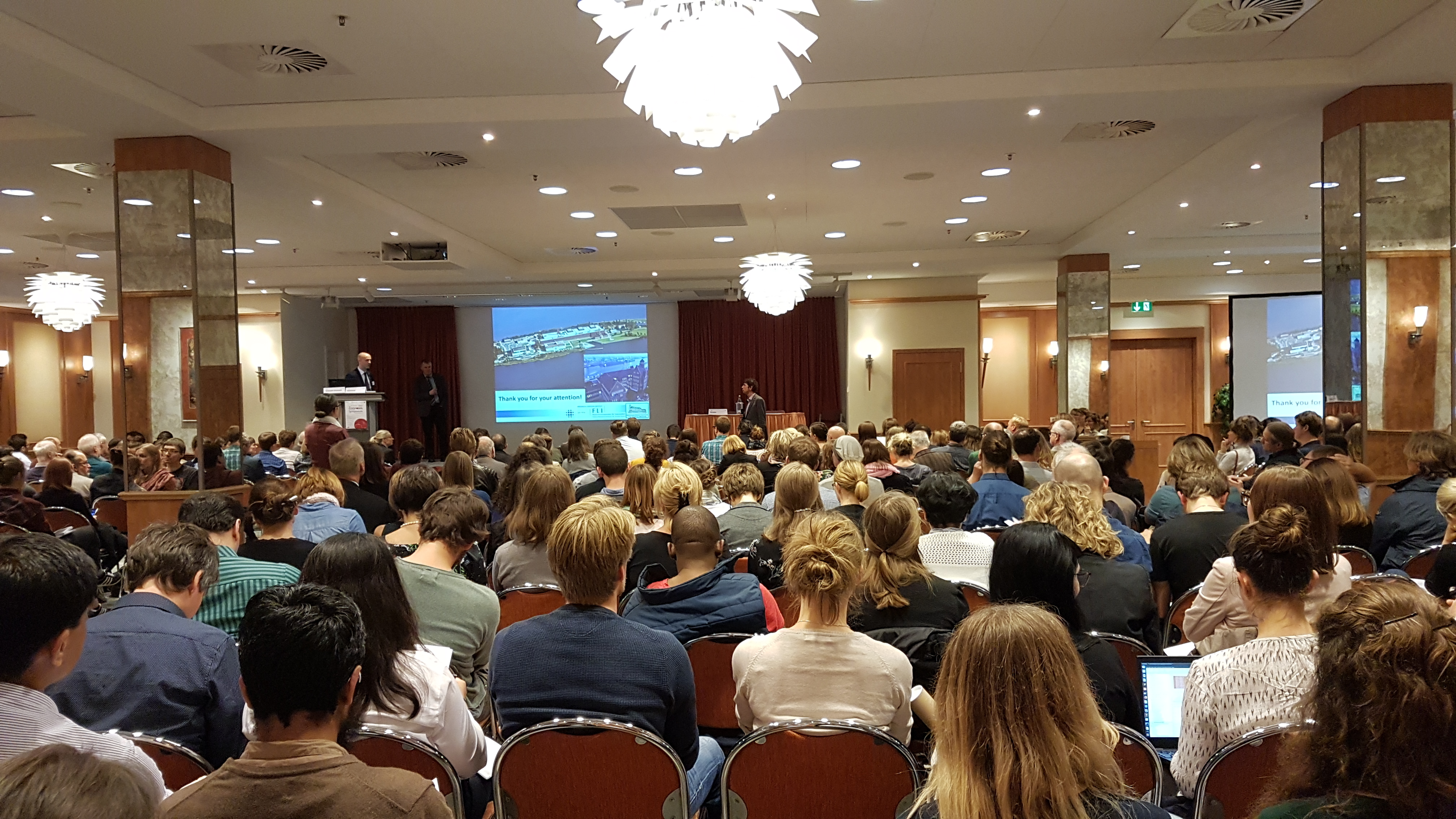
Interdisciplinary cooperation in zoonoses research: Prof. Schmidt-Chanasit and Prof. Martin Groschup gave a joint keynote talk on West Nile virus from the perspective of veterinary and human medicine
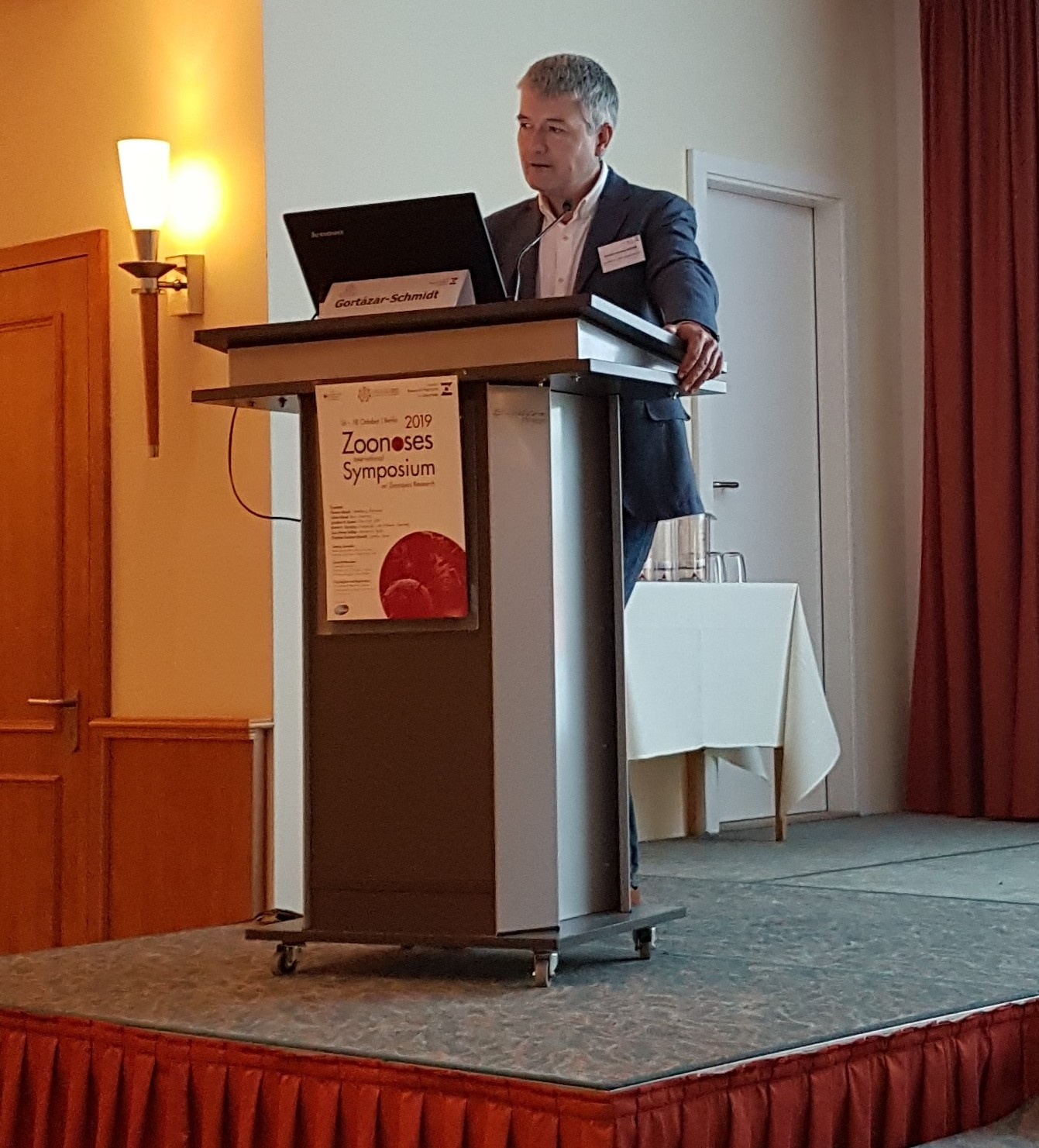
Zoonoses in the One Health context: Christian Gortázar Schmidt from the Universidad de Castilla appealed for a holistic approach to tuberculosis control
Holistic consideration of zoonoses - the One Health approach
In addition to West-Nile and Dengue, tuberculosis, leishmaniasis, filariasis (lymphatic filariasis, onchocerciasis) and the Nipah virus were the main topics of the keynote lectures by renowned researchers from various nations. The lectures made it clear that a holistic view of animals, humans and the environment in the sense of the "One Health" concept is important for successful control of zoonotic pathogens.
Prof. Christian Gortázar Schmidt, from the Institute of Wildlife Research at the University of Castilla in Spain, explained that in the fight against tuberculosis all factors such as farmers, affected wild animals, diagnostic methods and vaccine development must be taken into account. Dr. Jonathan H. Epstein of the EcoHealth Alliance, New York, also appealed for holistic strategies in the fight against zoonoses such as the Nipah virus. The transfer of zoonotic pathogens from wild animal populations to farm animals or humans requires the interaction of many conditions. It is not always easy to understand these complex transmission pathways. Once understood, however, this knowledge would reveal a multitude of possible intervention options.
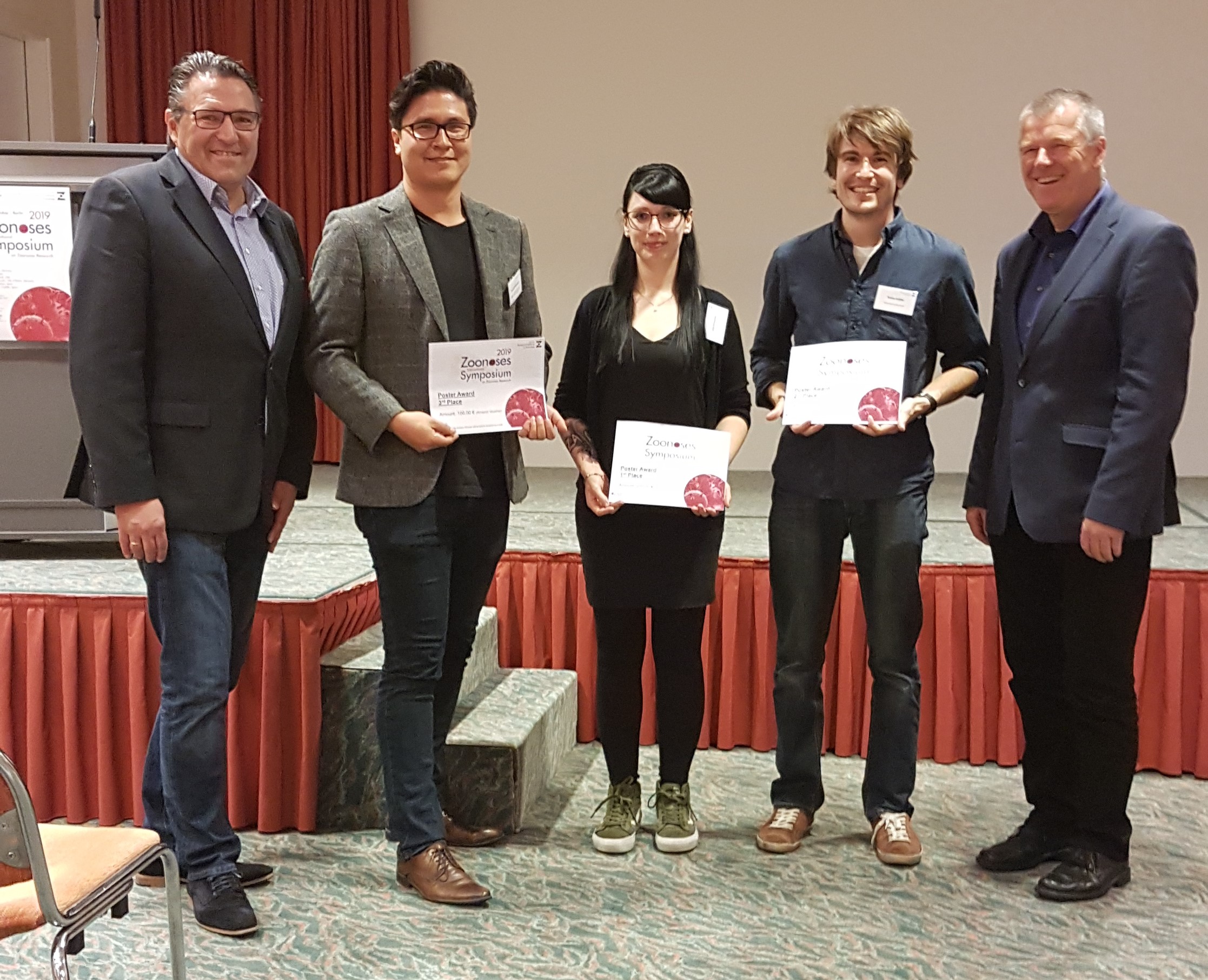 Professor Stephan Ludwig and Professor Martin Groschup presented the Poster Award 2019 to the winners (from left to right: Stephan Ludwig, Tobias Gräßle, Julia Schneider, Alexander Falkenhagen, Martin Groschup)
Professor Stephan Ludwig and Professor Martin Groschup presented the Poster Award 2019 to the winners (from left to right: Stephan Ludwig, Tobias Gräßle, Julia Schneider, Alexander Falkenhagen, Martin Groschup)
Promotion of young researchers
In addition to the scientific lectures, the zoonoses symposium offered numerous zoonoses researchers the opportunity to present their work by means of a poster. The three best posters by early-career scientists, chosen by the participants of the symposium, were awarded a poster prize.
In addition, young scientists were given the opportunity to talk with established researchers in the community at a social breakfast round, the Young Scientist Breakfast (YSB), on the last morning of the event. Individual career paths were discussed as well as the compatibility of work and family, successful project applications or the bureaucratic obligations of a professorship. Although, not everyone was happy about getting up so early, lively conversations developed at all tables after just a few minutes. (A detailed follow-up report on the YSB 2019 can be found here.)
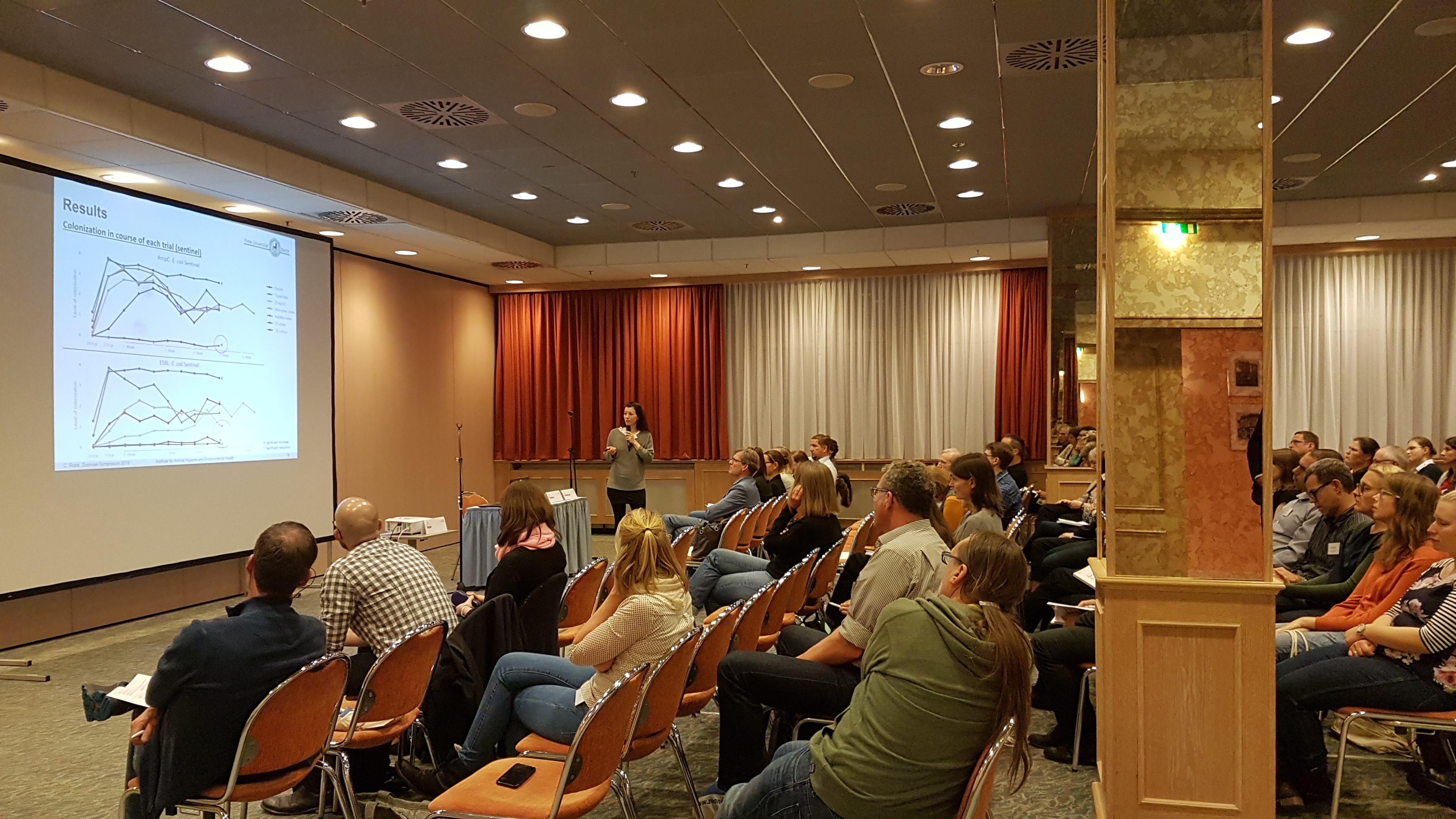
Full house - with 400 participants the symposium was fully booked and the individual thematic sessions were also very well attended
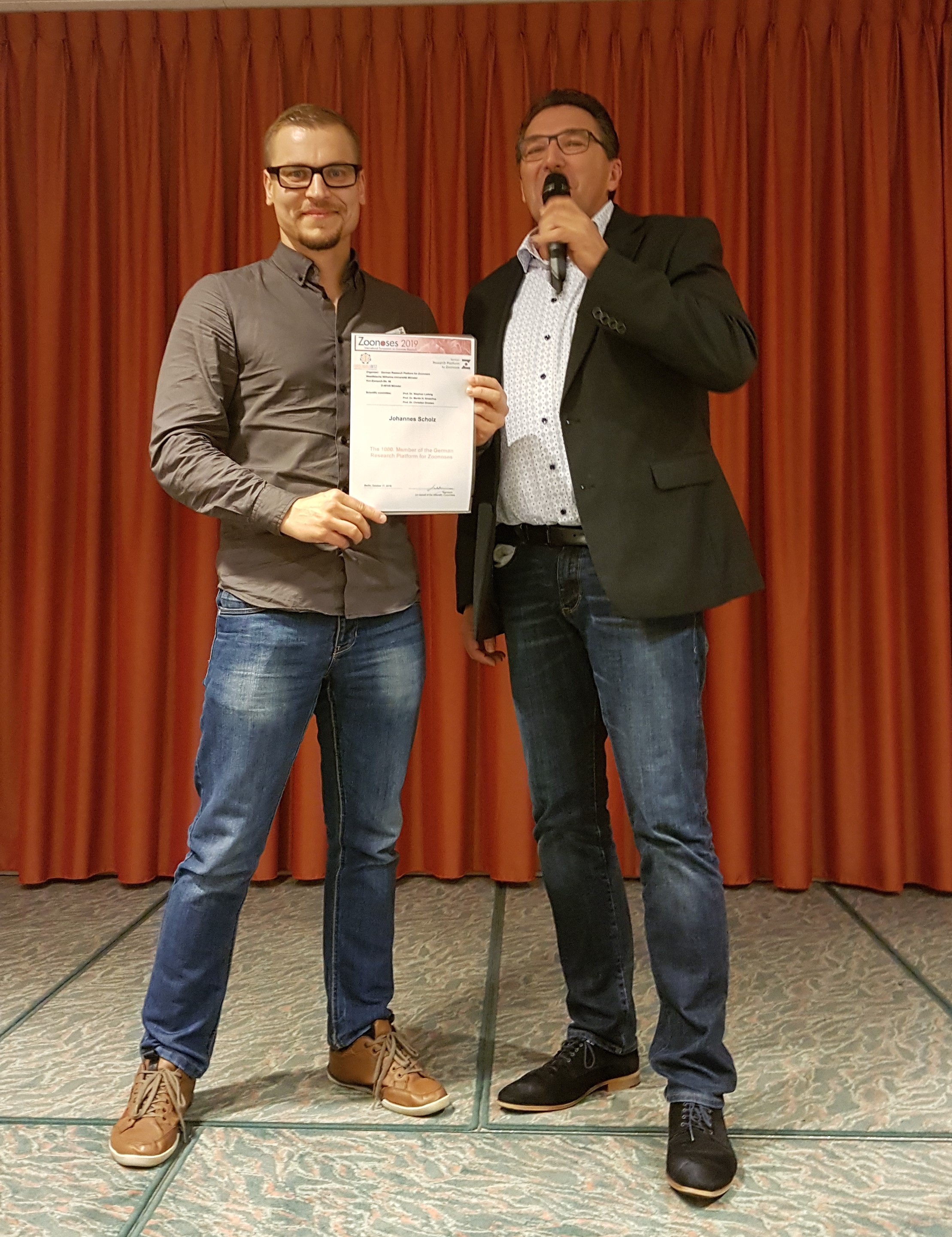
A steadily growing zoonoses research community in Germany - the German Research Platform for Zoonoses welcomed its 1000th member to the symposium. In honour of this special moment, Prof. Dr. Stephan Ludwig, head of the office site in Muenster, personally handed over the membership certificate.
A lively zoonoses research community in Germany
The International Symposium on Zoonoses Research served German and international zoonoses researchers as a platform for discussion and exchange. "I have rarely experienced a scientific conference where so much interactive exchange took place," said a participant from the Friedrich-Loeffler-Institute. "There were small groups in every corner, discussing lively scientific topics."
With almost 400 participating members of the zoonoses research community, the symposium was the largest since the beginning of the event format in 2009. The lively participation as well as the large number of topics represented and the high quality of the presented research work confirm the topicality and importance of zoonoses research in and for Germany. Furthermore, the German Research Platform for Zoonoses was able to welcome its 1000th member during the symposium.
This development shows that the German Research Platform for Zoonoses has succeeded over the last few years in establishing itself as an umbrella organization for zoonoses research in Germany and in creating an active and capable research community, which is further strengthened by the Research Network on Zoonotic Infectious Diseases. The broad spectrum of members covers the multitude of topics represented in zoonoses research.
The next International Symposium on Zoonoses Research will take place in Berlin from 14 to 16 October 2020.
text: Dana Thal



